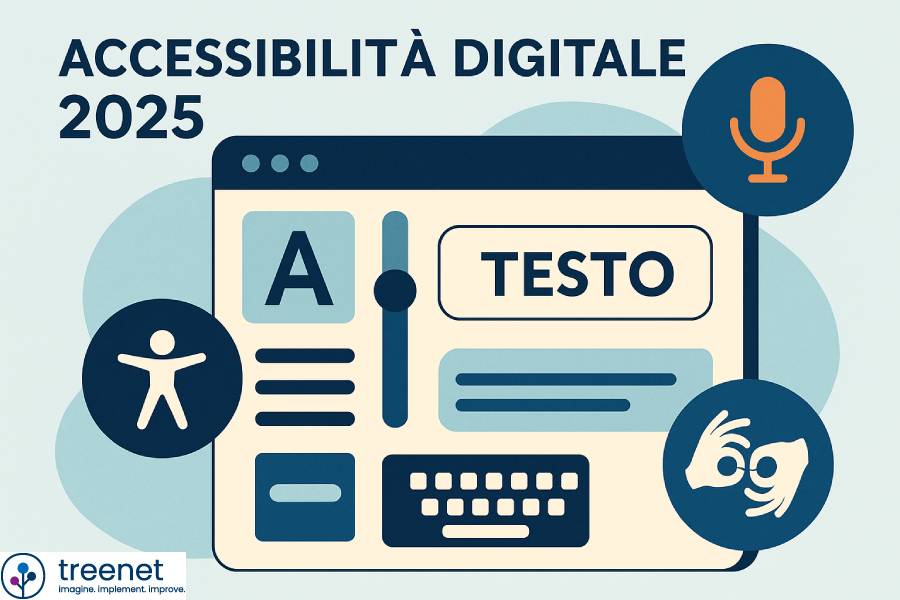2025 Digital Accessibility update


As of June 28, 2025, Legislative Decree 82/2022 has officially entered into force, implementing Directive (EU) 2019/882, commonly known as the European Accessibility Act. This regulatory change introduces new technical requirements to ensure the accessibility of digital services offered to consumers.
Many companies are still uncertain about which websites are legally required to comply with the accessibility law and how to proceed with the development of accessible websites, in order to avoid penalties while ensuring an inclusive user experience.
This article provides a technical and regulatory overview, useful for businesses that need to update their websites accordingly.
Contrary to what is often found online, not all corporate websites are subject to mandatory compliance. According to Article 1, paragraph 3 of Legislative Decree 82/2022, the obligation applies only to providers of specific digital services to the public, including:
Additionally, microenterprises (fewer than 10 employees or less than €2 million in annual turnover) are exempt, unless they receive public funding for accessibility or choose to comply voluntarily.
The decree, in line with the European Directive, does not limit e-commerce to online payment alone. The concept includes any form of interaction that leads to the conclusion of a contract, even if deferred over time.
Therefore, services subject to accessibility obligations also include:
| Web Functionality | Accessibility Required? | Legislative Decree 82/2022 | Directive (EU) 2019/882 | Legal References |
|---|---|---|---|---|
| Online sales (goods/services) | Yes | Art. 1, para. 3, letter f); Art. 2, letter hh | Art. 2(1)(f); Recital 45 | “services provided remotely […] to conclude a consumer contract” |
| Service bookings (e.g., appointments, visits, hotels) | Yes | Art. 2, letter hh; Art. 3, para. 2 | Art. 2(1)(f); Recital 45 | “booking, ordering, and payment systems” |
| Quote/commercial offer requests | Yes, if intended to lead to a contract | Art. 2, letter hh; Art. 3 | Art. 2(1)(f); Recital 45 | “at the individual request of a consumer […] to conclude a contract” |
| Contact form for commercial information | Yes, if pre-contractual | Art. 2, letter hh | Art. 2(1)(f); Art. 4(7)(a); Recital 45 | “if linked to pre-contractual services” (functional interpretation) |
| Post-sale support (technical or commercial) | Yes | Art. 12, para. 1; Annex I, Section IV | Art. 4(7); Recital 24 | “accessibility for the entire service experience, including post-sale phases” |
| Showcase/informational website, without contractual interactions | No (outside scope) | – | – | Not included under Art. 1, para. 3 |
| Download of brochures/catalogs, without contractual call-to-actions | No (unless used otherwise) | – | – | Outside the scope of Art. 2, letter hh |
If your company provides digital services related to sales, bookings, or online customer support, and it is not a microenterprise, then it is already required to have updated its website to meet accessibility requirements as of June 28, 2025.
Necessary actions include:
Excluding accessibility today means excluding millions of potential customers. According to data from ISTAT and the European Commission, more than 1 in 5 people in Europe lives with some form of disability—be it visual, motor, cognitive, or temporary (e.g., an injury, or limited use of a device).
Failing to consider these individuals means losing market share, increasing the risk of legal issues, and damaging brand reputation. It’s a contradiction for any company that seeks to improve sales, customer experience, and support—while neglecting those most in need of access to digital services.
“Investing in website compliance with accessibility law is not only a legal requirement, but a strategic and responsible choice to build a more equitable, modern, and high-performing future.”
Legal Disclaimer: This article is for informational purposes only and has no legal value. The interpretations are based on official sources and technical analyses of Legislative Decree 82/2022 and Directive (EU) 2019/882, but do not replace the advice of a qualified legal professional. For strategic business decisions, a tailored legal assessment is recommended.
Whether you're an IT manager, a marketing executive, or a business manager, we help you digitize business processes and simplify operations, enhancing user experience and saving valuable time.
CHOOSE TREENET AS YOUR ALLY FOR YOUR COMPANY:
Tell us about your goal by filling out the form!